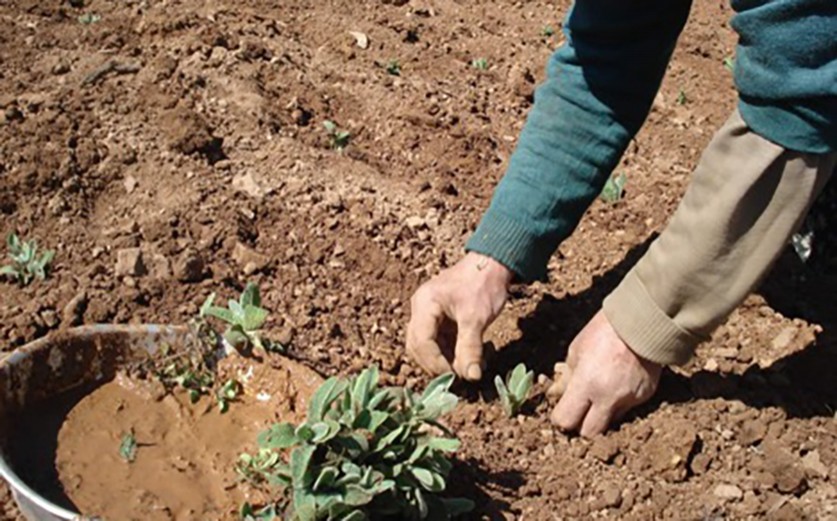Athens, Greece - The program of training seminars for Medicinal and Aromatic Plants (MAP), implemented by the Agricultural University of Athens (AUA), a part of the “New Agriculture for a New Generation” (NANG) program, has just begun its second phase. Under the direction of Falia Economou, a professor in the Faculty of Crop Science at AUA, the two-year training program adopted farms in four regions of Thessaly: Larissa, Vrinena Almiros near Volos, Farsala, and Grammatiko near Karditsa.
MAP are quite prosperous crops for the Greek rural economy. There is great demand for MAP from pharmaceutical companies because of their various health benefits, and the Greek climate favors the production of high-quality MAP products. “In my opinion, research on MAP is not being disseminated, so the advanced knowledge and the results from our experiments do not improve farmers’ yields or the quality of their products,” Falia said. “Most importantly, farmers do not have access to innovation related to the MAP sector, which is demanded by international market standards.” In response, Falia designed an integrated program to enable young farmers to learn everything they needed about MAP from farm to market, to establish the sector in a sustainable way.
Phase 1: Theoretical and Practical Training
Last year, AUA educated 60 farmers and young people from the four regions of Thessaly who were interested in developing MAP. The beneficiaries received 54 hours of theoretical training and 54 hours of practical training, which included instruction on farming issues (propagation, fertilization, irrigation, weed control), processing issues (how to harvest and dry), the development of a business plan, and marketing. “Most of the cultivation data comes from our own experiments at AUA,” said Petros Vahamidis, a teacher in the program. “Books don’t always give the full picture.”
The lack of certified plant material is one of the most serious problems that Greek farmers face. Instead of propagating their crops from certified mother plants whose genetic identity has been verified by the state, farmers use wild types of mountain tea, chamomile, and oregano. In order to have a substantial production of MAP that consistently meets international standards of quality, farmers in Greece must cultivate certified varieties. “One of our trainees plans to certify a specific species of mountain tea,” Petros said. “In order to do so, he must confirm that the genetic material is pure, test its uniformity, quality, and yield potential, and convincingly show that it is better than other varieties of Sideritis.”
For crops like oregano that are grown for their essential oils, farmers must bring their crops to a distillation company and certify their product by chemotype. This chemical certification is required in order for the product to meet industry standards. With oregano, for example, the main substance is carvacrol. The amount and quality of carvacrol in the plant depends on the cultivar but is also affected by farming practices like the soil, fertilization, and harvest time. Oregano does not need water or fertilizer, so if farmers add too much of either, the crop produces less carvacrol. The program teaches farmers how to obtain the certification and also best farming practices in order to obtain a typical chemotype.
“We visited the beneficiaries’ farms on Fridays and Saturdays,” Falia said. “We also organized trips into the mountains to identify wild cultivars and visited certified greenhouses and industrial distillation companies.” Falia is now administering this phase of the program to 15 new beneficiaries in Trikala.
Phase 2: Developing a Product
At the end of the first phase, AUA assessed its initial batch of 60 beneficiaries by asking them to each write a business plan. Falia and her colleagues then selected 5 beneficiaries from each region to participate in the second phase of the program, which runs until October. The beneficiaries in each region will work together and with economics professors from AUA to produce an innovative product from their MAP that they will then bring to market. “During this process, the beneficiaries will receive lectures from professors and industry leaders like APIGEA and APIVITA, and we will help them solve their problems,” Petros said. “They will have to research the market and the market needs to sell their product with a profit at the end.”
Tea producers Christos Mylonas and Tasos Xristopoulos were two of the five selected in Vrinena Almiros to continue to the second phase of the program. They intend to produce capsules with special blends of mountain tea and other local aromatic herbs that can be used in an espresso machine, and they are currently experimenting with various combinations of mountain tea with honey, mint, chamomile, fruit, and other ingredients from their village. “The group in Larissa wants to produce an oil with aromatic plants like chamomile,” Falia said. “We discussed the capabilities of their region and the local medicinal flora.”
“These beneficiaries entered the program as farmers, but I expect them to go out as businessmen,” Petros said. “Most of the farmers in Greece distrust new technology. They don’t even have email. So how do you tell them about precision agriculture? But the new generation is a different story. They have grown up with technology and are willing to absorb new perspectives, new ways of thinking. This generation of producers will also be more environmentally friendly, and equal to profit, sustainability is a big goal for us.”
“Our long-term vision is to organize the sector and establish a network of farmers who will continue to develop it, taking advantage of the many opportunities available in Greek and European markets for these products,” Falia said. “We will help them produce a product, and then the same farmers can cooperate to produce another and another. MAP offer so many possibilities: pharmaceutical and cosmetic products, collaborations with cheesemakers. The farmers just have to keep developing and innovating their certified indigenous species.”

